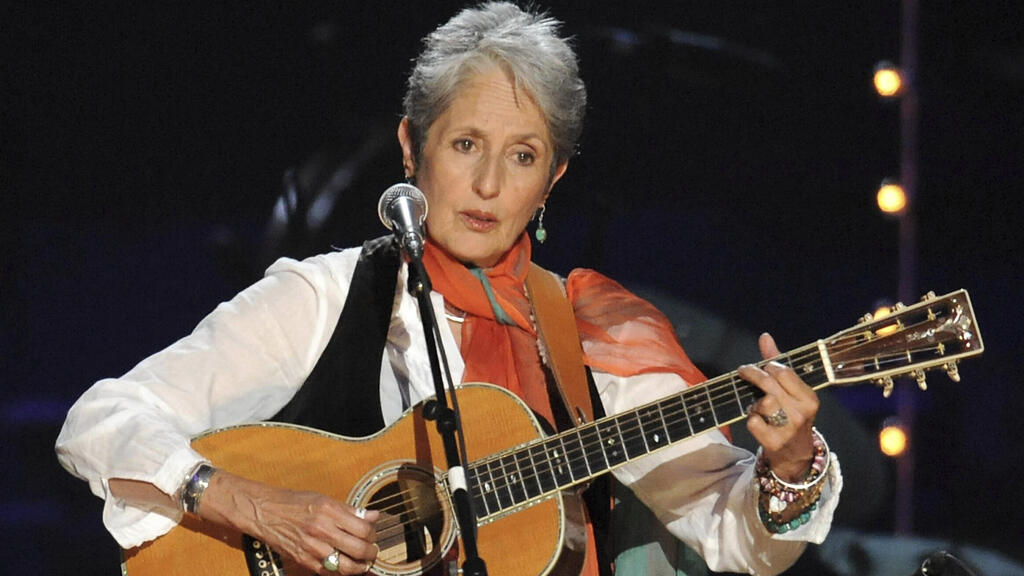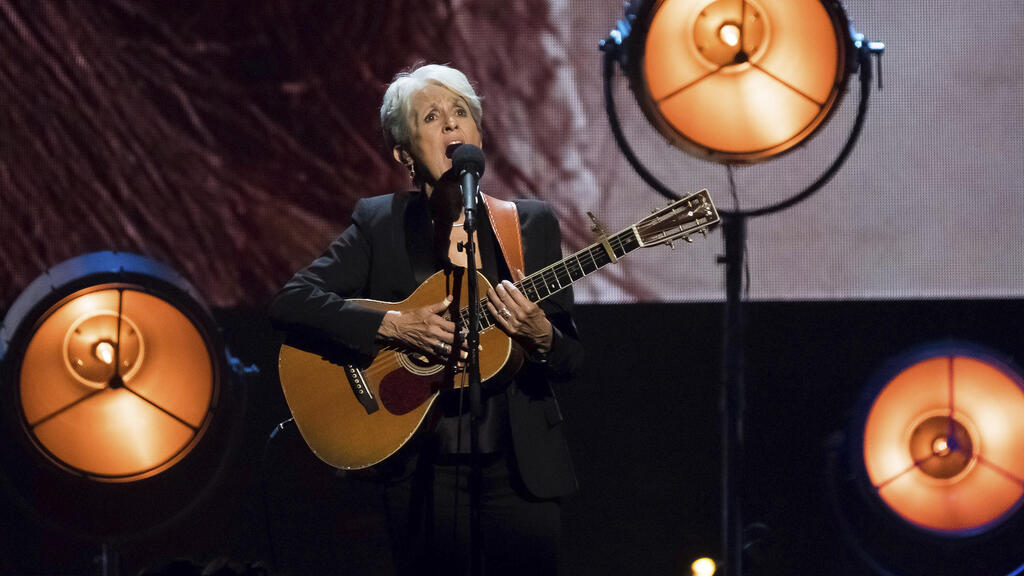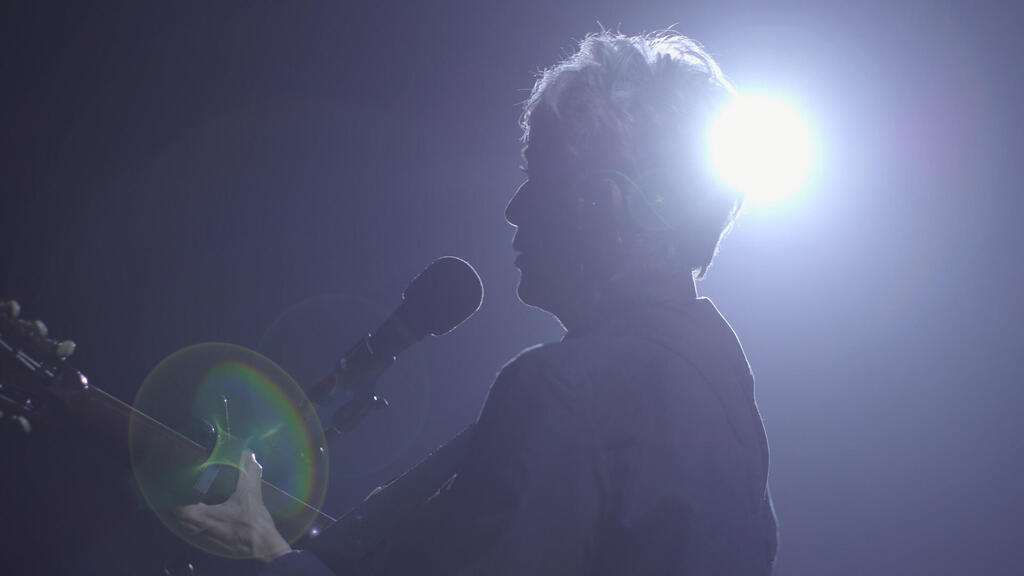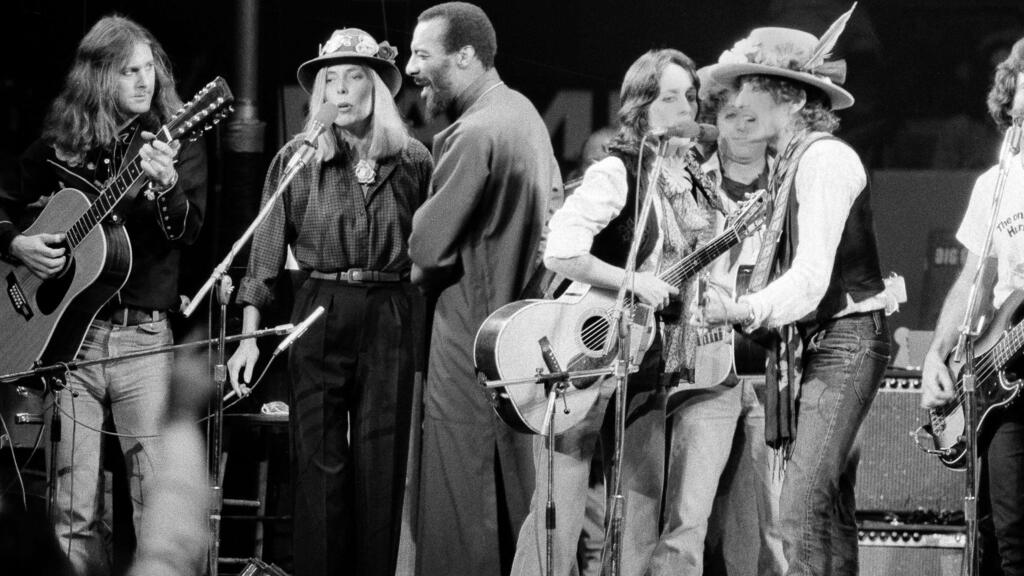It's hard to know where to start telling the story of Joan Baez, a revolutionary musician. In the 1960s the skimpy Mexican girl became famous overnight with her stirring folk songs and exceptionally clear soprano.
More Stories:
She was quickly adopted by the 'flower children' as the poster girl for Woodstock and during that decade, joined every social struggle including marching with Dr. Martin Luther King in Mississippi or standing by his side at his famous speech on the Washington Mall. Then, she sang We Shall Overcome which became the anthem of the fight for civil rights, defined the times, and brought hope to the masses.
She was the first to bring Bob Dylan to sing and revealed him to the world, but also paid for it dearly.
Baez also visited Israel in the past to add her voice to local social struggles and appeared before her Israeli fans. Although versatile in many musical genres she is most known for the men in her life be it Dylan or Steve Jobs.
5 View gallery
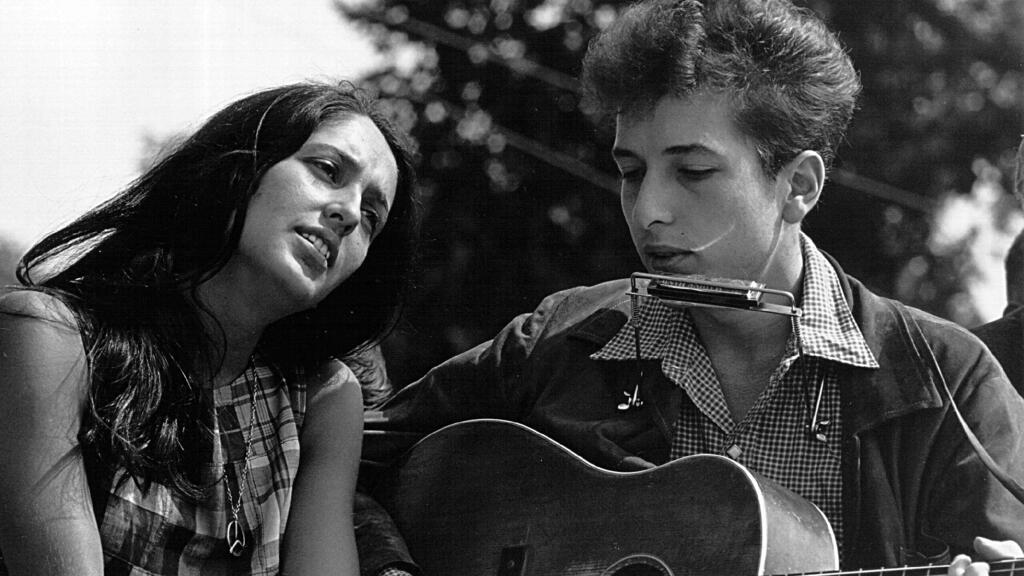

Joan Baez and Bob Dylan in 1963
(Photo: Rowland Scherman/National Archive/Newsmakers)
A new documentary shown at the Tel Aviv Doc Aviv festival, Joan Baez: I am A Noise, changes the narrative and places her in the center of her story. It examines her inner world through her approach to her painting, bringing pages from diaries and letters kept in her family and seen for the first time. Those pages reveal a tragic family secret.
Baez who is now 82 years old, with short silver hair and wide and open smile, spoke to us from her home in Los Angeles, sitting comfortably in her kitchen near a window looking out at a beautiful green view.
She seems well despite her vocal cords betraying her and says she is fit. She explains she could not come for the screening in Tel Aviv for logistical reasons but wants to support us. When she hears demonstrations have been ongoing for months and our democracy is in peril she cringes.
Clearly moved by any human suffering and social injustice she says she was not all that interested in attending the Doc Aviv festival because she received so many invitations. "But the minute your country went into crisis and I saw the protests and I, you know, and I saw what people were going through and about, I wanted to I wanted to go to Tel Aviv," Baez says.
So, you don't support the BDS boycott of Israel?
"I'm sorry, I wasn't even aware because I haven't been trying to get to Israel. I wasn't aware there was an official boycott. That's my ignorance. I've always been of two minds about it.
I wouldn't go to South Africa. And then Paul Simon called and he was having a big struggle whether he should go or not. And then he went and created that music with Ladysmith and with all of those people thought, I don't know where I stand on this. I mean, if I went to Israel and, you know, in an act of support, um, is that preferable to saying that I won't go?
But you know what I'm thinking as you ask, that if somebody goes there, if somebody goes to Sun City in South Africa to make money and, you know, like Las Vegas, that's one thing. Probably if you go to stand with the people, make your voice heard, and sing, that's another thing. That's my thing.
Baez blames the U.S. for signaling to other countries that weakening democracy is a legitimate option.
"You know, as the world. They always take their lead from this country, which used to be the first country in the world. And we don't give it out yet, but we're not taking the lead from here. And the lead now is bullying, lying, you know, on a huge scale. So, I think it kind of gives these other countries that have a tendency that way, open field to do that on a grand scale, which is, partly probably what's in what's going on in Israel at the moment. They're these bold steps. And usually or here anyway, most of it is just they're getting away with it. I mean happy to see that Netanyahu at least has to look around and figure out his next move."
The film reveals Baez's activism had crossed boundaries and continents throughout her life alongside serious emotional difficulties caused by the trauma described in the documentary. For years she struggled with anxiety and depression that impeded her ability to function sometimes and made it hard to raise her son and have intimate relationships. She said she seemed calm but was in fact depleted and that traveling around the world as she did helped her avoid herself and having to deal with her own trauma.
you say in the film it became sort of an addiction. You were addicted to the activism. Like instead of looking in you were always looking out.
Perfect. Yes. That's it. That was it. I couldn't even look around me because whatever was going on in my head was so muddled up. It was apparently more dangerous to be in my own kitchen than it was to be sitting in a bomb shelter in Hanoi or walking, kids around the border of Cambodia. I was safer out there.
Because of your mind that keeps going to dark places?
Exactly. Exactly
Hanoi sounds like a complete catastrophe from what I've read from your experiences there.
And so was Sarajevo. Um, and yet I walk into those things and I don't feel great at all. Yeah. Head on. And, you know, occasionally it catches up like sitting in the bomb shelter and the planes get closer, your heart begins to pound, and then there is a kind of terror, but it's a real terror. And the terror which I had in my mind, those were phobias, which means there's no real basis in reality. But there was a great basis in reality. And while I was there, I did not have panic attacks. I had an intelligent reaction to what was going on. But I didn't spend a lot of inward angst. it's as though they were replaced with something real.
So And when you were in those places, your brain was in survival mode, so it couldn't scatter.
Where did you get so smart?
I'm from Israel. We all have anxiety. I've watched a brilliant version of you doing Shir La Shalom?
I do. I absolutely do. Yeah. I remember trying to get as much memorized as possible and then read. I believe I read the rest. Yeah, those were important days as well. As well as now.
The film raises quite a few questions, among them what happens to a singer who loses her voice. Baez has become world famous thanks to her impressive range as a Soprano which she had considered a gift, her means to represent the struggles of the weakest member of society: the tired and poor. After years of attempting to preserve the flexibility of her vocal cords, she had reached the end of her rope and decided to resign from performing in 2019.
Is there something else that comes close to singing for you? Maybe dancing, like in the final scene of the film?
"It was a German guy who was a medium who reads your astrological chart. Somebody said, oh, you got to see this guy. And so he did whatever he had to do and took all the information. Then he had a long talk of which I remember one thing only at the very end he said, you know, the chart says, yes, you were here to sing. Yes, you were here to be an activist. Yes, you were here to draw. But mainly you were put on the earth to dance. Wow. That lovely. Because it's true. So, I mean, get up in the morning and I just set my watch and do ten minutes of dancing to start the day and then whenever I can in between.
So is this feeling close to singing?
I think probably closer to the singing because it's still putting out for someone else, the paintings and the drawings. I mean, that was the continuation. When the touring stopped, I just glided into my art studio and started painting acrylics of portraits. And then, there's also poetry. And I had just started doing a poetry book and I sent a few of those upside-down drawings to the publisher who said, Oh, let's do a book of that. It seems as though as long as I'm on output and creative, it's certainly a similar feeling. Yeah.
From the tragedy of losing that perfect voice, one of the most beautiful in the world of music, as a cruel part of aging, Baez dives for the first time into a family secret. The film asks what happens when you think something terrible happened to you when you were a child but there is no one left to talk to about it. What can you do when your memories cannot be trusted?
At 50, through hypnosis, Baez found out that she and her younger sister Mimi who died before filming began, were likely abused by their father. The abuse is not detailed in the journals, But Baez drew monsters with sharp teeth, and helpless girls hiding in the dark, which tells the entire story.
Do you feel now like a weight has been lifted off your shoulders that you've told this story for the first time, the story of your family?
And do you feel now like a weight has been lifted off your shoulders that you've told this story for the first time, the story of your family?
Not in those terms. But I know I feel something that had to be done. And now it's done. And I'm relieved. Yes. And I'm happy it came out the way it did.
Did you have any concerns that people might ask you what took you so long? You know, like a classic victim-blaming question?
I wanted my family to be gone. Even the milder stuff, the disagreements with the sisters and the hurt feelings and all of that, it would not have been appropriate, I don't think, to let that material out until they were gone.
I thought your relationship with your son was really moving, and I really loved the way that he's so kind and that he understands that you've had struggles that he wasn't even aware of.
I thought he was elegant. I didn't hear any of these things until I saw the film. And it was breathtakingly forgiving and kind of him, He was there at the San Francisco screening, so I could thank him in public. And, and my cousins were there and my nephew and niece were all there. And that was also a nice feeling to know that they had to deal with this stuff themselves. and had already seen the film and the fact that they came back to see it a second time in the theater. I thought it was a good thing.
how did you decide to do a documentary?
So we started talking about this years ago, and then it's got closer to the end of touring, and we began developing the idea of filming we didn't even know would really be the last tour. So we were kind of going into it saying, what is the 77, 79-year-old singer with this kind of career do when it's coming towards the end? Do you keep going? Do you stop? Why do you stop? And it was just becoming more and more clear, a lot of it because of the voice. So we started working on that. And then the change came when I received the key to the family storage.
[Co-director] Karen [O'Connor] and I were friends also. The work she's done is frontline so I felt I was in the proper hands and wanted to leave an honest legacy. It's as though my family is all gone. I have nothing to lose, and I want it to be as honest as I could.
The interview is disrupted when granddaughter Jazmin arrives. She is a fan of Taylor Swift. Lana Del Ray and Phoebe Bridgers.
"She's mainly Now it's Phoebe Bridgers," Baez says. "And of course, we know them all now, so she at least appreciates her grandmother."
I saw the duet with Lana Del Rey doing Diamonds and Rust. It was so beautiful. So do you maybe see Lana Del Rey as your sort of successor?
They're in a different world, Jasmine, Phoebe, Lana, and scores more, mostly women. But her last album, I Love L.A. It's crazy. And I like it a lot. And I like to be associated and friends with her because of the youth. We'll sing together but musically, there's not a great deal in common, and I don't expect anybody to be carrying my particular banner. It's nice when Phoebe in particular connects with slightly political things, certainly women things. I don't know how many more people that age are writing and thinking and feeling the way I did so intensely when I was younger. So, I don't know what's going on out there that really is effective in the way I was thinking and being back when I was young.
Why do you think your emotions were stronger?
I think my family had been disciplined Quaker types, which includes social action and dyed-in-the-wool nonviolent activists. As I mentioned in the film, my mother is more of a natural, nonviolent nature, and my father came out in a more studious way. I mean, blowing each other's brains out is not making a whole lot of sense, but certainly seeing them or my father openly expressing his feelings, you know, in Quaker meetings on the streets, wherever, that was fed in me.
Women in the world of music, were always viewed on the spectrum from saints (Melanie, Carol King,) to whores (Joni Mitchell, Carly Simon.) Mitchell, a contemporary who collaborated with Baez often suffered from slut- shaming because of her romantic choices. In 1971, Rolling Stones call her Queen of El-Lay, poking fun at her many lovers.
Baez was the antithesis and chose to be a kind of saint, who cares for the downtrodden of the world. As such she was not seen as a sexual being but rather pure and angelic despite a love affair with a woman named Kim who was her partner for a long time. The fact that that did not affect her image, or hurt her career is missing from her story.
People never ask you about your bisexuality and having come out in 1973
When the film is so full of other stuff and it's so old school, nobody gives a shit about whether I had a girlfriend or not. I mean, play this thing 20 years ago. 30 years ago. Oh, my God. But so far, you're the first person who's asked anything about that.
How so?
I think that has no shock value anymore.
And Kim isn't famous and your other exes are.
It was the one time and so that may be part of it. It's not as though I had these great sensational love affairs all through my life with women. It was just this one lovely girl.
But back then, David Bowie also had only one affair with a guy, and that was enough to end his career completely. So I guess there was a risk to stating that.
I never thought about it one way or another. I was kind of scratching my head. I mean, it was perfect. I said something and got picked up by the news. They were at my door in the morning and a friend of mine who was my son's godmother answered the door. Okay, so a woman answering the door. That's enough for the whole thing to blow sky high, you know, admits to bisexuality. So it was ridiculous.
I think you were kind of protected by your holiness, The saint imagery comes back a lot in the film.
I'm sure it did. I was busy protecting myself in every possible way, including holding a guitar like this and having my face covered. Yeah.


